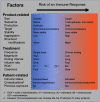Regulatory and strategic considerations for addressing immunogenicity and related responses in biopharmaceutical development programs
- PMID: 33948231
- PMCID: PMC8057416
- DOI: 10.1017/cts.2020.493
Regulatory and strategic considerations for addressing immunogenicity and related responses in biopharmaceutical development programs
Abstract
The last three decades have seen the biotherapeutic drug market evolve from promising concept to market dominance in a range of clinical indications. This growth has been spurred by the success of established drug classes like monoclonal antibodies, but also by the introduction of biosimilars, and more recently, multiple novel cell and gene therapies. Biotherapeutic drug development presents many unique challenges, but unintended immune responses are among the most common reasons for program attrition. Anti-drug antibodies can impact the safety and efficacy of drug products, and related immune responses, like the cytokine release syndrome that occurred in the infamous TGN-1412 clinical trial, can be challenging to predict with nonclinical models. For this reason, it is important that development programs proceed with a scientifically grounded and measured approach to these responses. This process begins at the discovery stage with the application of "quality by design," continues into the clinic with the development of quality assays and management strategies, and culminates in the effective presentation of this information in regulatory documents. This review provides an overview of some of the key strategic and regulatory considerations for biotherapeutics as they pertain to immunogenicity and related responses.
Keywords: Regulatory science; anti-drug antibodies; biotherapeutics; drug development; immunogenicity.
© The Association for Clinical and Translational Science 2020.
Figures
Similar articles
-
Immunogenicity assessment of biotherapeutic products: An overview of assays and their utility.Biologicals. 2015 Sep;43(5):298-306. doi: 10.1016/j.biologicals.2015.06.004. Epub 2015 Jul 3. Biologicals. 2015. PMID: 26144595 Review.
-
Industry experiences with immune-mediated findings in biotherapeutic nonclinical toxicology studies.Regul Toxicol Pharmacol. 2021 Feb;119:104825. doi: 10.1016/j.yrtph.2020.104825. Epub 2020 Nov 19. Regul Toxicol Pharmacol. 2021. PMID: 33220389
-
A fit-for-purpose strategy for the risk-based immunogenicity testing of biotherapeutics: a European industry perspective.J Immunol Methods. 2015 Feb;417:1-9. doi: 10.1016/j.jim.2015.01.003. Epub 2015 Jan 17. J Immunol Methods. 2015. PMID: 25602137 Review.
-
The Impact of Product and Process Related Critical Quality Attributes on Immunogenicity and Adverse Immunological Effects of Biotherapeutics.J Pharm Sci. 2021 Mar;110(3):1025-1041. doi: 10.1016/j.xphs.2020.12.003. Epub 2020 Dec 11. J Pharm Sci. 2021. PMID: 33316242 Review.
-
Immunogenicity of Biotherapeutics: Causes and Association with Posttranslational Modifications.J Immunol Res. 2016;2016:1298473. doi: 10.1155/2016/1298473. Epub 2016 Jun 29. J Immunol Res. 2016. PMID: 27437405 Free PMC article. Review.
Cited by
-
Clinical Immunogenicity of DaxibotulinumtoxinA for Injection in Glabellar Lines: Pooled Data from the SAKURA Phase 3 Trials.Toxins (Basel). 2023 Jan 10;15(1):60. doi: 10.3390/toxins15010060. Toxins (Basel). 2023. PMID: 36668880 Free PMC article. Clinical Trial.
-
Importance and Considerations of Antibody Engineering in Antibody-Drug Conjugates Development from a Clinical Pharmacologist's Perspective.Antibodies (Basel). 2021 Jul 26;10(3):30. doi: 10.3390/antib10030030. Antibodies (Basel). 2021. PMID: 34449544 Free PMC article. Review.
-
Advancing Subcutaneous Dosing Regimens for Biotherapeutics: Clinical Strategies for Expedited Market Access.BioDrugs. 2024 Jan;38(1):23-46. doi: 10.1007/s40259-023-00626-1. Epub 2023 Oct 13. BioDrugs. 2024. PMID: 37831325 Free PMC article. Review.
-
The Effects of the Biological Agents Infliximab, Vedolizumab, and Ustekinumab on Intestinal Anastomosis: An Experimental Study in Rats.Biomedicines. 2025 Apr 29;13(5):1079. doi: 10.3390/biomedicines13051079. Biomedicines. 2025. PMID: 40426907 Free PMC article.
-
Astrocyte-Derived Extracellular Vesicles for Ischemic Stroke: Therapeutic Potential and Prospective.Aging Dis. 2024 May 7;15(3):1227-1254. doi: 10.14336/AD.2023.0823-1. Aging Dis. 2024. PMID: 37728588 Free PMC article. Review.
References
-
- Wan H. An overall comparison of small molecules and large biologics in ADME testing. ADMET & DMPK 2016; 4(1): 1–22.
-
- The Alliance for Regenerative Medicine. Available Products [Internet]. (https://alliancerm.org/available-products/).
-
- Office of Tissues and Advanced Therapies. Approved cellular and gene therapy products [Internet], 2019. (https://www.fda.gov/vaccines-blood-biologics/cellular-gene-therapy-produ...).
-
- US Food and Drug Administration (FDA). FDA Statement: Statement from FDA Commissioner Scott Gottlieb, M.D. and Peter Marks, M.D., Ph.D., Director of the Center for Biologics Evaluation and Research on new policies to advance development of safe and effective cell and gene therapies [Internet], 2019. (https://www.fda.gov/news-events/press-announcements/statement-fda-commis...).
Publication types
LinkOut - more resources
Full Text Sources
Other Literature Sources
Miscellaneous

